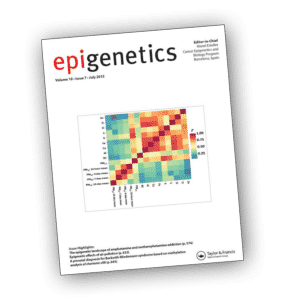Companies like 23andMe and Ancestry.com have made consumer genetics a household name by showing us how DNA can provide information about our health and ancestry. We all have about 20,000 genes and each gene can have sequence variation that influences, among other things, our susceptibility to disease. Epigenetics adds a layer of complexity to our genes – literally. “Epi” means above.
Epigenetics refers to the changes that occur above our genes.
These include chemical modifications to the DNA that affect the activity of genes. Epigenetic changes are specific to cells and tissues – meaning, a gene in a blood cell will have different epigenetic patterns than the same gene in a brain cell for example. Consequentially, there’s an interplay between genetics and epigenetics that is integral to understanding disease and developing treatments.
Patrick McGowan and his team at the University of Toronto published a paper in Epigenetics titled, “Genome-epigenome interactions associated with ME/CFS”.
There are methods used in this paper that are important to understand because they increase the robustness of their results.
Samples from a well-defined clinic population of ME/CFS patients were used. They isolated T cells to profile DNA methylation rather than look at the epigenetics from all the blood cells mixed together. This is important because the epigenetic patterns are specific to each immune cell type. Rather than lump all ME/CFS patients and compare to all healthy control samples, McGowan excluded samples from ME/CFS and control subjects whose symptom scores overlapped. This helped decrease heterogeneity and amplify potentially meaningful differences between ME/CFS and healthy controls.

This is one of the largest ME/CFS epigenetic studies to date and identifies new genetic and epigenetic associations relevant to ME/CFS and useful for the development of new treatments.
This research would not have been possible without the Bateman Horne Center. BHC recognizes the opportunity for discovery that ME/CFS and FM represents. We identify and partner with the best and the brightest scientists to accelerate research for the diagnosis and treatment of ME/CFS and FM by leveraging our research ready patient population. The samples and clinical data BHC provided to McGowan for his research represent $75,000 in value. This means that our science partners like McGowan don’t need to use their precious grant funds on recruitment and sample collection and can focus on innovation and discovery. Read more about BHC’s strategic plan to advance research and mainstream ME/CFS here.
If this content has been useful to you or a loved one, we invite you to check out our free online class series, explore our online library, read our blog, and subscribe to our monthly newsletter. We thank you for your continued support as we press forward in our vision to create a world where patients with ME/CFS and FM are readily diagnosed, effectively treated, and widely met with empathy and understanding.
Please consider making a donation to BHC, a 501 (c)3 nonprofit organization today.
Read the full paper in Epigenetics, “Genome-epigenome interactions associated with ME/CFS” here.
1 doi: 10.4172/2155-9899.1000228


 Lucinda Bateman, MD, is a renowned clinician, researcher, and educator. Her Johns Hopkins University Medical School training instilled an approach to care that she has employed throughout her career - the patient comes first and the unknown or unexplained does not equate to a lack of proper and compassionate care. Since starting her own practice in 2000, she has served on six boards or committees, been the principal investigator for 45 studies, authored/coauthored 40 journal articles, served as adjunct instructor and adjunct assistant professor in the University of Utah Departments of Preventative Medicine, Internal Medicine, and Anesthesiology, and lectured around the world.
Lucinda Bateman, MD, is a renowned clinician, researcher, and educator. Her Johns Hopkins University Medical School training instilled an approach to care that she has employed throughout her career - the patient comes first and the unknown or unexplained does not equate to a lack of proper and compassionate care. Since starting her own practice in 2000, she has served on six boards or committees, been the principal investigator for 45 studies, authored/coauthored 40 journal articles, served as adjunct instructor and adjunct assistant professor in the University of Utah Departments of Preventative Medicine, Internal Medicine, and Anesthesiology, and lectured around the world.